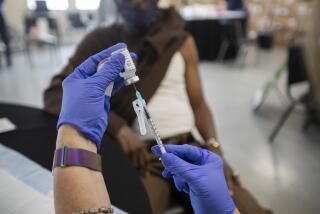Health Care Access Problems Not Limited to Poor, Study Says
- Share via
WASHINGTON — About 41 million Americans, most of them middle class, had trouble getting some type of health care, ranging from surgery to eyeglasses to psychotherapy, in 1994-95, according to a study released Sunday.
“Ability to pay is the most important factor in health care,” said Mark Berk, co-author of the survey done by Project HOPE and funded by the Robert Wood Johnson Foundation.
“But in looking at the access problems, we found that 57% of the people were not poor,” he added in a recent telephone interview. In fact, 12% of those reporting some unmet health need had annual incomes of more than $50,000.
The problem is of course more acute for lower-income people and the working poor, who often do not get insurance on the job and are hard pressed to afford their own.
One in four lower-income Americans reported being unable to obtain the health care he or she thought necessary, compared with one in six middle-income Americans.
The survey of 3,450 people in 1994-95 found that dental care was the most difficult for people to obtain. About 8.5% reported not being able to get the care when they thought they needed it. And one in 20 could not get glasses.
Just under 6% could not get medical care or surgery, and 4.7% said they had trouble getting prescription drugs.
A quarter of black Americans, one in six Latinos and one in seven whites reported health access problems.
Berk said the health care reform bill now in Congress, sponsored by Sens. Nancy Landon Kassebaum (R-Kan.) and Edward M. Kennedy (D-Mass.), does address some of the access problems, particularly for those people who change jobs but are barred from new insurance because of existing health problems. Although the central tenets of that bill are popular, some of the amendments and some additional language in the House version mean its political future is uncertain.
More to Read
Sign up for Essential California
The most important California stories and recommendations in your inbox every morning.
You may occasionally receive promotional content from the Los Angeles Times.













